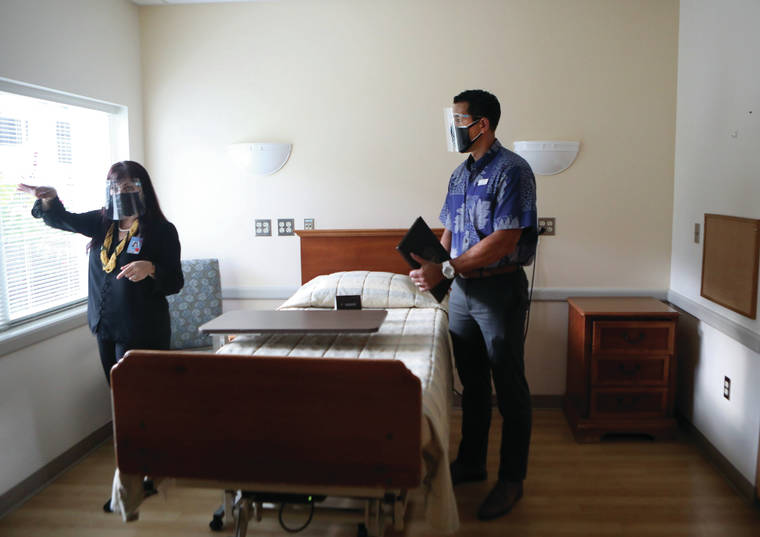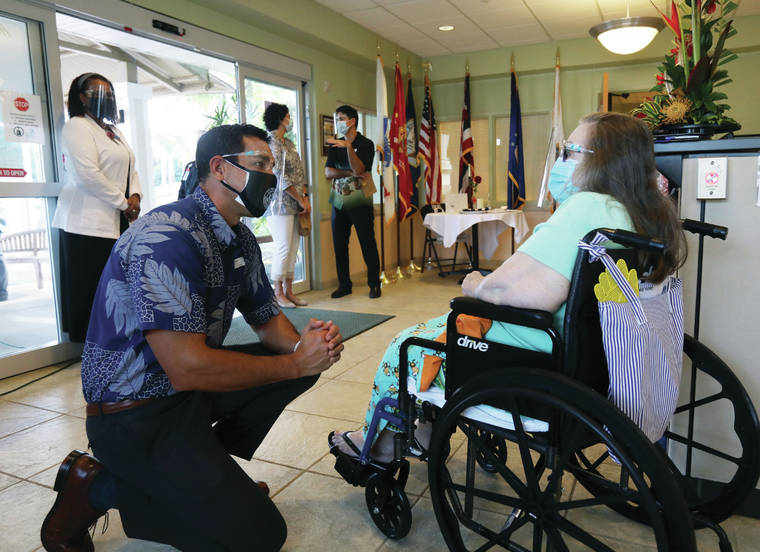Kahele talks COVID relief, infrastructure

Administrator Kaui Chartrand talks about resident rooms while U.S. Rep. Kai Kahele tours Yukio Okutsu State Veterans Home in Hilo on Wednesday. (Kelsey Walling/Tribune-Herald)

U.S. Rep. Kai Kahele talks with Barbara Dawson-Perry before touring Yukio Okutsu State Veterans Home in Hilo on Wednesday. (Kelsey Walling/Tribune-Herald)
U.S. Rep. Kai Kahele is touting the merits of the $1.9 trillion American Rescue Plan — the third and probably last federal coronavirus relief package — and President Joe Biden’s plan to spend upwards of $3 trillion on America’s infrastructure.
U.S. Rep. Kai Kahele is touting the merits of the $1.9 trillion American Rescue Plan — the third and probably last federal coronavirus relief package — and President Joe Biden’s plan to spend upwards of $3 trillion on America’s infrastructure.
In an interview with the Tribune-Herald Friday at his as yet unopened district office in Hilo, Kahele — a freshman Democrat who represents rural Oahu and the neighbor islands — called Biden’s COVID relief package “one of the most important and significant legislation passed by the Congress.”
ADVERTISING
“One of the big differences between the ARP and the first two relief bills, is that in the first two relief bills, local counties and municipalities were left out of those bills,” Kahele, who turned 47 Sunday, said. “… So what the American Rescue Plan did was to make sure that local city and county municipalities got money.
“Hawaii County is getting $39 million, direct from the U.S. Treasury. … It goes straight from the treasury to the County of Hawaii, $39 million. And they’re going to get the first installment of that within the first 60 days of the bill being signed into law. … That’s going to be about $19 million that’s going to come right into Hawaii County.”
He said Mayor Mitch Roth and his administration, working with the County Council, will decide how best to allocate the funds.
“I think the first thing they do … is to make the county whole, to fill the budget deficit due to COVID because of the lack of spending, tourism, general excise tax revenues, (transient accommodation tax) revenues, whatever. And then, they should have another $19 million to do what they feel they need to do in terms of getting through the pandemic and things the county needs.”
In addition, Kahele said ARP contains billions to fund COVID-19 vaccinations to everyone who wants them; provide money for individuals through direct stimulus payments, unemployment benefits increases and subsidies for those who lost jobs to keep their group health plans; get students back to in-person instruction; and fund Small Business Administration grants for business owners to make payroll, keep the lights on, make up for lost revenue and put employees back to work.
“I think this is the big, bold piece of legislation that the country needed,” he said. “There’s a lot of great things in the American Rescue Plan, and the fact that we were able to pass it so quickly is a direct result of unified government. As slim as the majorities are, the Democrats control the House and the U.S. Senate. We’ve got a Democratic president in the White House. We got the bill to the president’s desk for his signature in less than 60 days. And it’s an incredible bill.”
There’s also $14 billion for the airline industry, which is vital to Hawaii’s tourism-dependent economy.
“Hawaiian Airlines was going to furlough 900 employees on the first of April,” Kahele said. “They had sent out notices in January. Nine hundred employees and their families were going to be out on the street, come April 1. Because of the American Rescue Plan, Hawaiian Airlines canceled every one of those furloughs. And every one of those employees will stay on their jobs and keep their health care plans. And that’s the same for Delta and United and every other major airline in this country.”
Kahele, a Hawaiian Airlines pilot, remains on the company payroll, he said, but added he flies only about thrice a quarter to keep his “currency and proficiency as a Hawaiian Airlines pilot.”
He said his income from that job is capped at about $29,000 a year by congressional rules.
Kahele keeps the job because he has “a report card every two years” from the voters, and said being the only working commercial airline pilot in Congress allows him to bring “a unique perspective” to the House Transportation and Infrastructure Committee and its aviation subcommittee he sits on.
Like the latest coronavirus relief legislation, Biden’s $3 trillion plan to update and upgrade the nation’s aging and crumbling infrastructure is likely headed for a partisan fight in Congress — especially, if anticipated, it’s partially funded by tax increases on corporations and the wealthy.
Kahele said “an injection of infrastructure money” is needed to get people back to work and the economy going again.”
He said the initiative, if adopted, could fund “big, bold ideas like high-speed rail for certain parts of the country, to (repairing or replacing) outdated roads, highways, bridges, 21st century schools, airports, harbors — things like that.”
“I met with the council and the mayor to identify what the key projects are for Hawaii County that need to be done,” Kahele said. “Probably the biggest, most expensive project for this county that I’ve heard … is wastewater. Our wastewater system here in Hawaii County is in bad shape. … The fact that there’s a mandate for every home throughout the state to be off cesspool in the next 20 to 25 years.
“That, and the combination of not having an upgraded, modern wastewater system are posing big issues for the county. That’s hundreds of millions of dollars in investment. And what we don’t want is what happened in Maui County where there’s lawsuits, the (Environmental Protection Agency) gets involved — and then, the county is faced with severe penalties and fines due to our wastewater issues.
“That’s something that might be addressed through this infrastructure bill.”
Email John Burnett at jburnett@hawaiitribune-herald.com.


